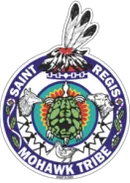With each passing year, fewer community members are able to recall a time when the Saint Regis Mohawk Tribe faced financial hardship — a time when the Tribe struggled to fund essential services and keep community members employed. Even fewer may recall the creativity, ingenuity, and cooperative efforts of tribal leadership and business owners at that time to develop a revenue stream that continues to benefit the Akwesasne community decades later.
In stark contrast to today, the limited availability of federal and state grant programs placed a financial strain on many crucial community programs; such as health, environment, and education. As our community’s population grew, so did the need for these and other important services however, external funding remained non-existent or stagnant. One community program where this was most evident was in the area of public health.
Situated in a white building that existed in the present-day parking lot of the Saint Regis Mohawk Health Services, the tribal clinic shared the small facility with the community’s museum, library, and tribal government. Space was limited, but the clinic did its best to meet the medical and dental needs of community members, including those who were non-insured.
In the decades following the clinic’s opening, the number of patients increased, but with limited funding, so did their deficit. The need for community healthcare exceeded the clinic’s annual budget and posed a financial challenge for the tribal government. Entrusted with the health, safety, and welfare of its membership; tribal leaders pursued ways to generate revenue that would supplement this essential program’s budget.
Simultaneously faced with pressure from outside governments to impose taxation on sovereign territory, business owners and tribal leadership also sought to keep needed revenue in Akwesasne. Working together to face the challenge and to improve the overall well-being of all Akwesasnhró:non, a cooperative relationship took root that entailed the development of our community’s own comprehensive regulatory and tribal licensing system.
Through the issuance of tribal licenses and the remittance of fees; initially from fuel sales to support the clinic; repeated efforts by external agencies were thwarted and helped lay the foundation for Akwesasne businesses. In the decades that followed, the addition of tribal tobacco and alcohol licensing fees provided an additional revenue stream that continues to support essential community programs and services.
Over the years, tribal licensing fees have supported the educational goals of our youth, improved our community’s roadways, contributed to language immersion programs, helped care for our elders, purchased fire trucks and critical life-saving equipment, funded public health and safety programs, and supported numerous community organizations, among other areas that have provided employment and contributed to local business development.
With the imminent legalization of adult use marijuana, the development of this new industry in consultation with tribal membership will provide another opportunity to exercise our community’s authority in developing a comprehensive regulatory system that satisfies federal guidelines. Doing so will help ensure that this industry will benefit all Akwesasnhró:non by providing employment and fees that will help fund essential community programs and services.
The failure to move forward together under the auspices of the tribal government however, will be a missed opportunity for economic diversification and, before they even open for business, shuts the door on community members who are seeking to open legally under the Tribe’s Adult Use Marijuana Ordinance.
#####
The Saint Regis Mohawk Tribal Council is the duly elected and federally recognized government of the Saint Regis Mohawk People.

